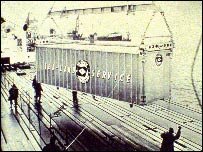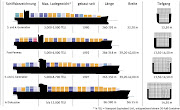Container vessel schedules are very tight for each voyage. There is very little room for tardiness and even less room to make up for any lost time.
Most liner vessel services are made up of 7-8 vessel completing the same route. Each time a vessel completes its service route the voyage number changes. These services carry many different shipper cargo and each of whom are watching the calender for when the vessel is scheduled to arrive. If the vessel is any amount of time off that schedule the shippers want to know why and are reasonably upset. These delays in the schedule can be caused by many different variables. The first group is called 'uncontrolled.'
The uncontrolled group is made up of any variable that can not be controlled by the vessel master or the vessel schedule manager such as; weather, engine malfunction, Government inspections, natural or unnatural disaster, canal or harbor closings, berth congestion, and many others that can not be foreseen. Berth congestion is a tricky variable that many different sectors blame the others for. Berth congestion can be just that, too many vessel in one area at the same time or a delayed vessel causing others to be delayed. One delayed vessel at a scheduled terminal causing a domino affect on other vessels that are on-time. Some smaller terminals can not fit more then 2/3 vessels on the dock, thus delaying waiting vessels.
The second group are controlled variables such as; volume surges, terminal production, vessel speed, port skips. Out of this group, the port skips category is the most controversial, because sometimes the only way for a Carrier to get their vessel back on schedule, is to skip a smaller port. When a port is skipped the import cargo must be discharged in the next closest port and the export cargo is then rolled to the next vessel in that particular vessel's service. It is very difficult to explain to a shipper why a Carrier skipped their POC and their cargo could not load.
Vessel Integrity is different depending on what US coast you are working out of. The West Coast services have much more extra time built in to their schedule and must only cross one ocean. This is a much easier route, but much more congested. The US East Coast services have extremely tight schedules and do not have much extra time built into the schedules. USEC services also have to work their schedules around the canal they choose to use. For India/Asian/USEC services most Carriers will use the Suez canal. Suez canal services travel longer distances and must face Atlantic Ocean weather but are typically much less expensive to transit, much less congested, and at this time pass larger ships through. Other USEC service vessels must pass through the Panama canal The Panama canal vessels face many delay issues here. The PC is constantly dredging and due to the narrowness of sections can only move a certain amount of vessels and size vessels. The PC also services vessels that have pre-scheduled their transit a year in advance, and the vessel must transit that delay or forfeit their spot. Once a vessel misses their scheduled transit they must buy an auctioned spot from 50,000 USD to 500,000 USD. This can delay a vessel greatly and cost an enormous amount of money.
All these factors cause vessel Service Integrity to be the most difficult part of a Carriers service to provide, yet the most important and Customer driven objective.
About Me
- Transportation Industry Debater
- North East Coast, United States
- I am a transportation executive and have worked in the container shipping industry for most of my career. I have experience in terminal operations, rail operations, vessel operations, liner management, and contract negotiation. I find myself always searching for something new to learn, as well as other professional opinions about different issues, obstacles, and changes with in the industry. I have searched for a forum to discuss these happenings with other professionals but have found none. For this reason I have decided to create my own. I will put up my opinions and hope for the blog to catch on, so I may read others.
August 25, 2008
Subscribe to:
Post Comments (Atom)







No comments:
Post a Comment